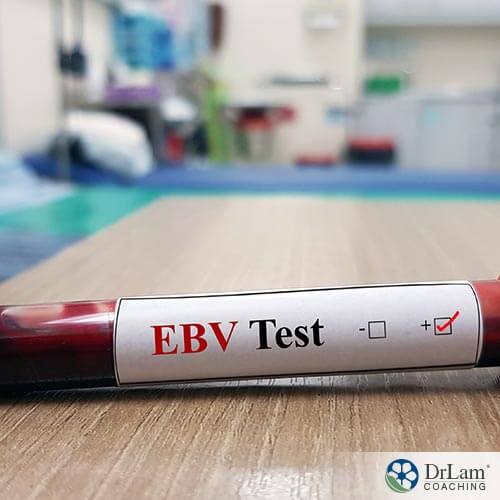 Fibromyalgia is a chronic condition that involves pain in different areas of the body, accompanied by fatigue, sleep disturbance, and cognitive dysfunction. It took a long time for the medical community to recognize fibromyalgia as a genuine health condition and understand its causes. Fibromyalgia involves the maladaptive response of the body to stressful conditions involving infections such as Epstein-Barr virus, hepatitis C, parvovirus, trauma, or psychological stress. You should know how Epstein-Barr virus and fibromyalgia are connected, their effect on your body, and what you can do to address the problem.
Fibromyalgia is a chronic condition that involves pain in different areas of the body, accompanied by fatigue, sleep disturbance, and cognitive dysfunction. It took a long time for the medical community to recognize fibromyalgia as a genuine health condition and understand its causes. Fibromyalgia involves the maladaptive response of the body to stressful conditions involving infections such as Epstein-Barr virus, hepatitis C, parvovirus, trauma, or psychological stress. You should know how Epstein-Barr virus and fibromyalgia are connected, their effect on your body, and what you can do to address the problem.
There has been uncertainty in pinpointing the exact cause of fibromyalgia with theories ranging from alternations in internal pain pathways and changes in neurotransmitters and hormones, to different viral infections. The Epstein-Barr virus and fibromyalgia have shown a close association, with this virus being responsible for a considerable number of patients with fibromyalgia.
Epstein-Barr Virus, also called the human herpesvirus 4, is one of the most common human viruses, with a majority of people getting infected at some stage of life. The transmission of the Epstein-Barr virus occurs commonly through bodily fluids, mainly saliva. It can cause infectious mononucleosis, also known as mono or the “kissing disease.”
The Epstein-Barr virus becomes latent or inactive in your body when you get the infection if your immune system is strong. The virus gets reactivated when your immune system is weakened, leading to chronic symptoms such as pain and fatigue, characteristic of fibromyalgia.
Research studies have been done connecting infection with Epstein-Barr virus to fibromyalgia and the related syndrome of chronic fatigue. The Epstein-Barr virus infection associated with fibromyalgia is generally not acute. Rather, it is an intracellular activation of an old infection, leading to a rise in IgM antibodies that can be easily detected in patients of fibromyalgia with symptoms of fatigue.
Further evidence has shown that there is an imbalance of the immune system manifested by a rise in antibodies and the development of clinical symptoms such as fatigue on exposure to early, non-structural, Epstein-Barr virus encoded protein in patients with fibromyalgia. Therefore, Epstein-Barr virus and fibromyalgia can be related to each other, due to the similarity of symptoms and immune response of fibromyalgia to the infectious agents.
 The association between Epstein-Barr virus and fibromyalgia indicates the exposure of the body to an external stressor leads to a stress response in the body. Studies have shown that there are alterations in the hypothalamic-pituitary-adrenal (HPA) hormone axis and the sympathetic nervous system (fear-flight-fight component of the nervous system) in fibromyalgia. This is suggested by the initial increase and then decrease in the levels of the anti-stress hormone, cortisol, and neurotransmitters such as adrenalin in patients of fibromyalgia with marked fatigue. The levels of antibodies against Epstein-Barr virus have been found to be raised in patients with severe fatigue and high pain intensity. It was recommended that lowering the titer of antibodies can improve the clinical symptoms of fibromyalgia, indicating the role of Epstein-Barr virus in stress response of the body and causation of pain and fatigue.
The association between Epstein-Barr virus and fibromyalgia indicates the exposure of the body to an external stressor leads to a stress response in the body. Studies have shown that there are alterations in the hypothalamic-pituitary-adrenal (HPA) hormone axis and the sympathetic nervous system (fear-flight-fight component of the nervous system) in fibromyalgia. This is suggested by the initial increase and then decrease in the levels of the anti-stress hormone, cortisol, and neurotransmitters such as adrenalin in patients of fibromyalgia with marked fatigue. The levels of antibodies against Epstein-Barr virus have been found to be raised in patients with severe fatigue and high pain intensity. It was recommended that lowering the titer of antibodies can improve the clinical symptoms of fibromyalgia, indicating the role of Epstein-Barr virus in stress response of the body and causation of pain and fatigue.
The HPA hormone axis is the main pathway through which your body sends stress messages to the body. The early stages of the stress response are characterized by an increase in cortisol levels as the adrenals release more anti-stress hormones to restore your normal bodily functions. Cortisol production eventually falls after the peak is attained, and the adrenals become unable to cope up with the cortisol requirement. This state involving initial rise and gradual fall of cortisol and other anti-stress hormones manifests as generalized fatigue and is commonly called Adrenal Fatigue Syndrome (AFS).
The Epstein-Barr virus and fibromyalgia trigger the NEM stress response which is composed of six circuits of organs and systems that work in collaboration against stress. The primary circuit that is involved with this is the Inflammation circuit. Part of the Inflammation circuit is the immune system. The immune system comes under attack from EBV and may lead to fibromyalgia and other issues as discussed.
The handling of Epstein-Barr virus and fibromyalgia involves a multidisciplinary approach, integrating various modalities to control the NEM stress response in your body. The corrective plan consists of decreasing stress and modifying your lifestyle.
The initial management of fibromyalgia is focussed on decreasing or eliminating the imbalance caused by the stressor Epstein-Barr virus. The therapies which decrease stress include cognitive-behavioral based therapies, mainly for comorbid depression, anxiety, and pain; meditative movement therapies such as tai chi, yoga, and meditation; and education sessions led by therapists to enable patients to recognize individual lifestyle factors that precipitate fatigue and stress.
Diet plays a crucial role in the recovery from adrenal fatigue associated with fibromyalgia. To start with, eliminate foods that cause inflammation of the gut such as gluten, dairy, sugar, deep-fried foods, refined carbohydrates, alcohol, sodas, and any food or drink with chemical additives. This should be accompanied by the inclusion of increased amounts of vegetables, followed by proteins, healthy fats including nuts and seeds, legumes, beans, whole grains, and fruits in your diet.
Since fibromyalgia is a chronic condition, it requires increased amounts of rest and good sleep. For good quality sleep, avoid caffeine, go to bed at the same time each day, have a clean, dark room, and rest during the day as well.
The length and amount of exercise will depend upon the extent of your adrenal fatigue. It is a good idea to start with mild breathing exercises, gradually increasing the intensity and length of physical activity as you regain your energy levels.
Supplements help you to regain vitality and regulate the NEM circuits. Various vitamins, minerals, nutrients, and herbs can be taken as supplements in fibromyalgia. Always consult your health coach before you start any supplement as dosing and strength can change depending on your body’s constitution and stage of adrenal fatigue.
If you are experiencing pain and fatigue from fibromyalgia, some things you can do to get relief from your situation are:
 Increase your intake of vegetables such as sprouts, spinach, kale, ginger, and garlic.
Increase your intake of vegetables such as sprouts, spinach, kale, ginger, and garlic.No matter what actions you decide to take, however, please seek advice from your healthcare practitioner who will assess a supplement’s benefits for you as well as recommend the correct dosage.
If you would like to get additional information or need assistance with herbs for fibromyalgia, the team at Dr. Lam Coaching can help. We offer a free** no-obligation phone consultation at +1-626-571-1234 where we will privately discuss your symptoms and various options. You can also send us a question through our Ask The Doctor system by clicking here.
The association between Epstein-Barr virus and fibromyalgia represents the exposure of the body to an external stressor leading to the stress response of the body responsible for adrenal fatigue. The immune response of the body is also activated on exposure to the virus.
